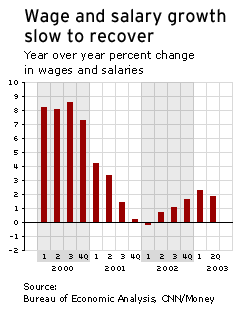NEW YORK (CNN/Money) -
Even if you've managed to keep your job during the nation's longest labor market slump since World War II, you've probably felt some of the pain in your paycheck -- and there's a good chance you'll keep feeling it through 2004, according to recent surveys of employers.

Though the economy has grown steadily since the 2001 recession, the labor market has been a different story -- 2.8 million jobs have been slashed since March 2001, when the recession began.
Despite a recent acceleration in the economy, most economists don't expect unemployment next year to fall much below its August level of 6.1 percent.
With 13.7 million Americans either unemployed and looking for work or too discouraged to keep trying, the labor market belongs to the buyers -- the employers, that is -- and wage and salary growth has slowed.
"Wages have stagnated over the past couple of years; employers have no incentive to change wages," said Anthony Chan, chief economist with Banc One Investment Advisors. "Eventually we will see incentive packages moving more closely in line with growth in the economy, but it's not going to happen soon."
In the late 1990s, when the unemployment rate dipped below 4 percent, wage and salary growth, as measured by the Commerce Department, rose at an average rate of 7 percent a year. Even as stocks plunged in 2000, wages and salaries grew 8 percent.
That growth rate dropped to 2.4 percent in 2001 and a paltry 0.9 percent in 2002 -- compared with annual changes in consumer price inflation, as measured by the Labor Department, of 2.8 percent and 1.6 percent, respectively.
While wage growth rose to a 1.9 percent year-over-year growth rate in the second quarter, it's still far from its heyday, and recent surveys suggest the stagnation will continue well into next year.
Surveys say: small raise
Earlier this month, outsourcing firm Hewitt Associates (HEW: Research, Estimates) said salary increases in 2003 were the lowest since it started keeping track in 1976, and its survey of 1,276 employers revealed salary increases in 2004 weren't likely to be much better.

Pay increases for salaried employees not eligible for overtime averaged 3.4 percent in 2003 and will average 3.6 percent next year, the survey said. Raises for salaried employees eligible for overtime averaged 3.3 percent in 2003 and are seen at 3.5 percent in 2004.
Executive pay raises averaged 3.5 percent in 2003 and will average 3.7 percent in 2004, the survey said.
Though salary increases have actually been steadily shrinking for the past few decades, that decline was offset in the boom years of the 1990s by bigger bonuses and other kinds of "variable pay," according to Hewitt spokesman Ken Abosch. But the Hewitt survey found the percentage of companies offering variable pay fell for the first time in 2003 and will likely fall again in 2004.
"Most employees view base salary as a barometer of their worth, so thinking about a steady decrease in the amount of money being provided to them has had a psychological impact," Abosch said. "That's why organizations looked to variable pay as a way to counteract that -- until recently."
Hewitt's results echoed those of an earlier survey of 1,700 employers by Mercer Human Resource Consulting, which found that pay raises planned for 2004 averaged 3.5 percent, up just a bit from the 3.3 percent average raise in 2003.
| Related stories
|

|
|
|
|
"Employers are less concerned with 'chasing the market' in terms of pay. They are more internally focused on what they can afford," Mercer spokesman Steven Gross said in a statement. "They can do this because the balance of labor supply and demand has tilted in their favor, at least temporarily."
The reason these pay raises -- which are higher than the rate of inflation, at least -- don't translate into higher wage-and-salary growth across the board, said Banc One's Chan, is that employers are paying new workers far less.
"When the economy is booming and you want to hire new workers, you have to attract them with money," Chan said. "Today, all you have to offer is a job."
A recent survey of 110 businesses by Chicago outsourcing firm Challenger Gray & Christmas found that many companies were giving raises and bonuses instead of hiring new workers. And 87 percent of respondents planned to limit those raises to between 2 and 5 percent.
"Many companies are proceeding with caution, putting off most hiring and asking employees to assume additional responsibilities to assure increases in customer demand are met," the firm said.
The productivity bonus
One reason wages haven't fallen completely off the table in this environment is the strength of productivity, a measure of output per hour, which grew in 2002 at the fastest rate since 1950. Productivity cuts corporate costs and lifts profits, which makes raises and bonuses possible.
"We're seeing the productivity gains split up between wage increases and profits," said Scott Brown, chief economist at Raymond James & Associates.
Several analysts were excited when the Commerce Department reported corporate profits grew at an 11 percent rate before taxes and other items in the second quarter, calling it a hopeful sign for hiring and wage growth.
But after taxes corporate profits actually fell 3.4 percent, and the annual rate of "undistributed profits" -- what's left for companies after taxes and dividends -- tumbled 64 percent. At that rate, all U.S. companies will have a grand total of just $13.9 billion left over for raises, bonuses, investment and expansion.
"That's not a lot of money available to hire new workers and invest in new equipment -- if businesses wanted to do that, and that doesn't seem to be case," said Richard Yamarone, chief economist at Argus Research.

|

